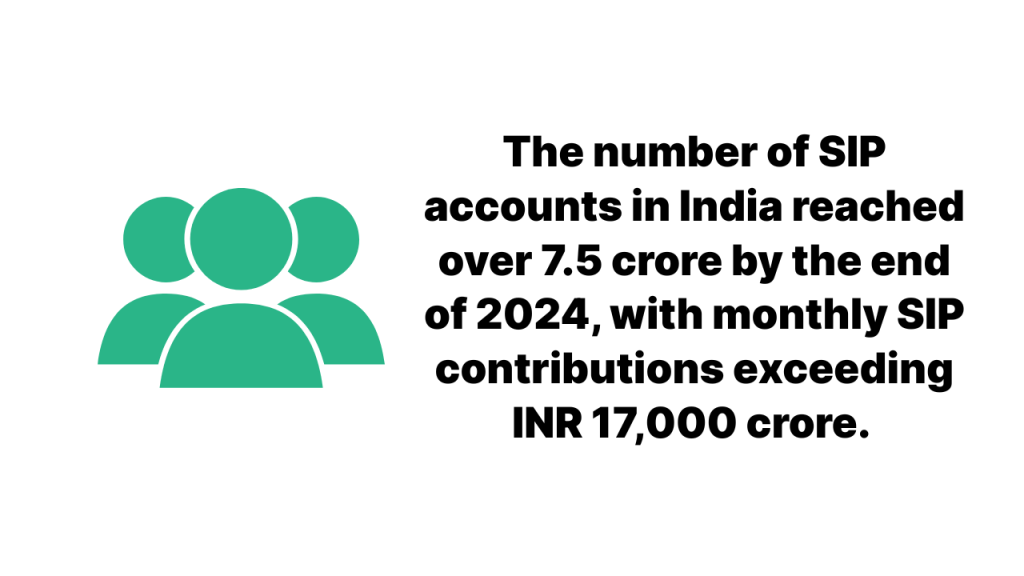Systematic Investment Plans (SIPs) have completely changed how ordinary investors approach asset generation in the mutual fund industry.
SIPs offer a hassle-free and disciplined way to invest in mutual funds every month, making it easy for even inexperienced investors to trade stocks. SIPs remove the need for market timing and promote a long-term investing strategy by investing a specified amount at regular intervals (usually monthly).
With growing awareness and financial literacy, SIPs have become a preferred investment avenue in India.

According to the Association of Mutual Funds in India (AMFI), the number of SIP accounts reached over 7.5 crore by the end of 2024, with monthly SIP contributions exceeding INR 17,000 crore.
But amidst the growing popularity of SIPs, one frequently asked question remains: Does the SIP date matter?
This blog aims to answer that question in depth and guide you to choose the best SIP dates for mutual funds based on logic, data, and personal financial planning.
How SIP Works in Mutual Funds?
To understand the relevance of SIP dates, it is crucial to grasp how SIPs work:
- NAV (Net Asset Value): When you invest via SIP, the amount is used to buy units of the mutual fund based on the prevailing NAV on the SIP date.
- Units Allocation: The number of units you receive depends on the NAV of that day. Lower NAV means more units are purchased for the same amount.
- Rupee Cost Averaging: Over time, you invest at various NAVs, which averages out the cost of your units, reducing the impact of market volatility.
- Consistency is Key: The main advantage of SIPs is consistent investing, which benefits from compounding and long-term market growth.
Investing in SIPs enables investors to accumulate wealth over time, unlike lump-sum investments that are vulnerable to market timing concerns. This methodical technique is especially helpful for middle-class and salaried professionals who might not have a lot of money to invest all at once.
Furthermore, SIPs help cultivate a savings habit, promote budgeting discipline, and reduce emotional investing, where investors often panic during market dips or get overconfident during booms.
Importance of SIP Date in Mutual Fund Investments
Let’s address the elephant in the room: Does your SIP date significantly impact your returns?
The short answer: Not drastically, but it can make a minor difference over the long term.
Even while SIPs are meant to smooth out investment costs over time, the precise day your SIP is implemented may result in little changes in NAV. When long-term investors spend substantial sums of money, even minor variations might add up to significant impacts.
However, it’s critical to remember that these differences are rarely substantial enough to significantly impact your financial goals. What matters more is your ability to stay invested consistently.
SIP Execution and the NAV Factor. The NAV used for SIP allotment is determined by the time your investment is processed:
- Transactions before 3:00 PM on a business day usually receive same-day NAV.
- Transactions after 3:00 PM or on non-business days receive the NAV of the next working day.
This means that holidays, weekends, and delays in ECS processing can impact the actual NAV you receive. While these fluctuations are minor, they can accumulate over time.
Is it Worth Chasing the Perfect SIP Date? No. Attempting to time the market, even with SIPs, contradicts the core philosophy of this investment method. Instead, focus on choosing a date that ensures consistent investing without any disruptions.
Best SIP Dates – What Experts & Data Say
Though there’s no one-size-fits-all answer, data suggests some general patterns:
- Common SIP Dates: Most investors choose dates such as 1st, 5th, 7th, 10th, 15th, 25th, and 30th.
- Early Month SIPs: These align with salary credits and are less prone to failed transactions due to insufficient balance. However, NAVs at the beginning of the month may sometimes be higher if markets rally after monthly closings.
- Mid-Month SIPs (10th–15th): Often considered ideal to avoid market noise during opening and closing days. Less traffic on fund house servers may also ensure smoother execution.
- End-of-Month SIPs (25th onwards): Can be riskier if funds are low due to month-end expenses. But in volatile months, NAVs might be lower.
Historical Trends & Backtesting: Backtests comparing various SIP dates have been carried out by financial platforms including Groww, Kuvera, and Value Research.
A SIP in the Nifty 50 over ten years, spanning various dates (the first, the tenth, the fifteenth, and the twenty-fifth), revealed a marginal CAGR variation of 0.3% to 1%
Nevertheless, investor behavior (continuity and discipline) was more important than the date.
Real-World Market Patterns: Some investors follow behavioral finance-based strategies. For example:
- Markets may react strongly at the start due to FII inflows and mutual fund rebalancing.
- Mid-month dates may fall in calmer phases with lower volatility.
- Month-end dates sometimes witness F&O expiry, which can introduce volatility.
Factors to Consider While Choosing SIP Dates
- Salary and Income Date: This is perhaps the most practical criterion. Choose a date a few days after your salary hits your account to avoid bounce issues.
- Bill Payment & EMI Cycle: Ensure SIPs don’t clash with high-payment days like EMI debits, credit card dues, utility bills, etc.
- Multiple SIPs Strategy: If you invest in multiple funds, consider staggering them across different dates to smooth NAV fluctuations and reduce single-day risk.
- Bank Processing Delays: Avoid choosing dates on weekends or holidays. A SIP scheduled for the 1st may get processed on the 3rd if the 1st is a Sunday.
- Tax-Saving SIPs (ELSS): Start early in the financial year and schedule SIPs before 15th March to avoid last-minute tax-saving stress.
Practical Tips to Choose the Best SIP Date
- Avoid the 1st if Possible: Though popular, it often clashes with salary delays, rent, and EMIs.
- Pick a Buffer Date: Choosing the 3rd, 7th, or 10th gives buffer time after salary.
- Multiple SIPs? Stagger It: Investing INR 30,000 monthly? Split it into three SIPs of INR 10,000 each on the 5th, 15th, and 25th.
- Leverage NACH/ECS Efficiency: Set up mandates for auto-debit. Ensure your bank has working NACH mandates.
- Track for 3 Months: Review how your SIPs are being executed. If any bounce or NAV delays occur, consider changing the date.
- Choose Fund House-Friendly Dates: Some AMCs have smooth processing on mid-month dates with lesser system load.
Can You Change SIP Dates Later?
Yes. SIPs are flexible. You can change SIP dates using these methods:
- Through the AMC website/portal or the distributor platform
- Submit a SIP change form (online or offline)
- Cancel the SIP and register a new one with a new date
Changing dates may take 10–20 business days to reflect, depending on the AMC and platform.
Scenarios to Change SIP Dates
- Job change and new salary credit date
- Cash flow mismatches or bounced SIPs
- Switching to multiple SIP dates for smoother investing
Charges & Considerations: Most AMCs don’t charge for SIP date changes. However, some platforms may have process fees or lock-in conditions (especially in ELSS funds).
Expert Opinions & Research Studies
- AMFI India: “Choose any date that ensures regularity. The most critical factor is not to miss your SIP.”
- Morningstar: “A SIP date may matter in the short term, but long-term gains depend on how long and how much you stay invested.”
- Groww Reports: “Over a 10-year SIP period, the difference between the best and worst SIP date was less than 1.2% CAGR.”
- ET Wealth Experts: “Align your SIPs with cash inflow and not market timing. Use staggered SIPs if the amount is large.”
Conclusion: What’s the Final Take?
While there is no universally “best” SIP date, the following principles can help:
- Align your SIP date with your income and expenses
- Ensure a sufficient balance in the account on that date
- Use multiple SIP dates only if you invest large sums monthly
- Don’t overthink the NAV for one day—focus on long-term consistency
Whether you invest on the 5th or the 25th, what matters is that you don’t miss the month.
Consistency trumps precision. SIP is about removing emotion and building a habit. Stick to your plan, review periodically, and adjust only if required.
And what better way to invest in mutual funds than to sign up with MoneyIsle and get as much flexibility as possible with your SIPs.
MoneyIsle is one of the fastest-growing stock trading platforms.
Bonus: Tools to Help You Choose the Right SIP Date
- SIP Return Calculators (from AMFI, Groww, ET Money)
- NAV History Charts (on Value Research, Moneycontrol)
- Market Volatility Trends (NSE data, charting platforms)
- Budget Tracking Apps (to align SIPs with your expense cycle)











